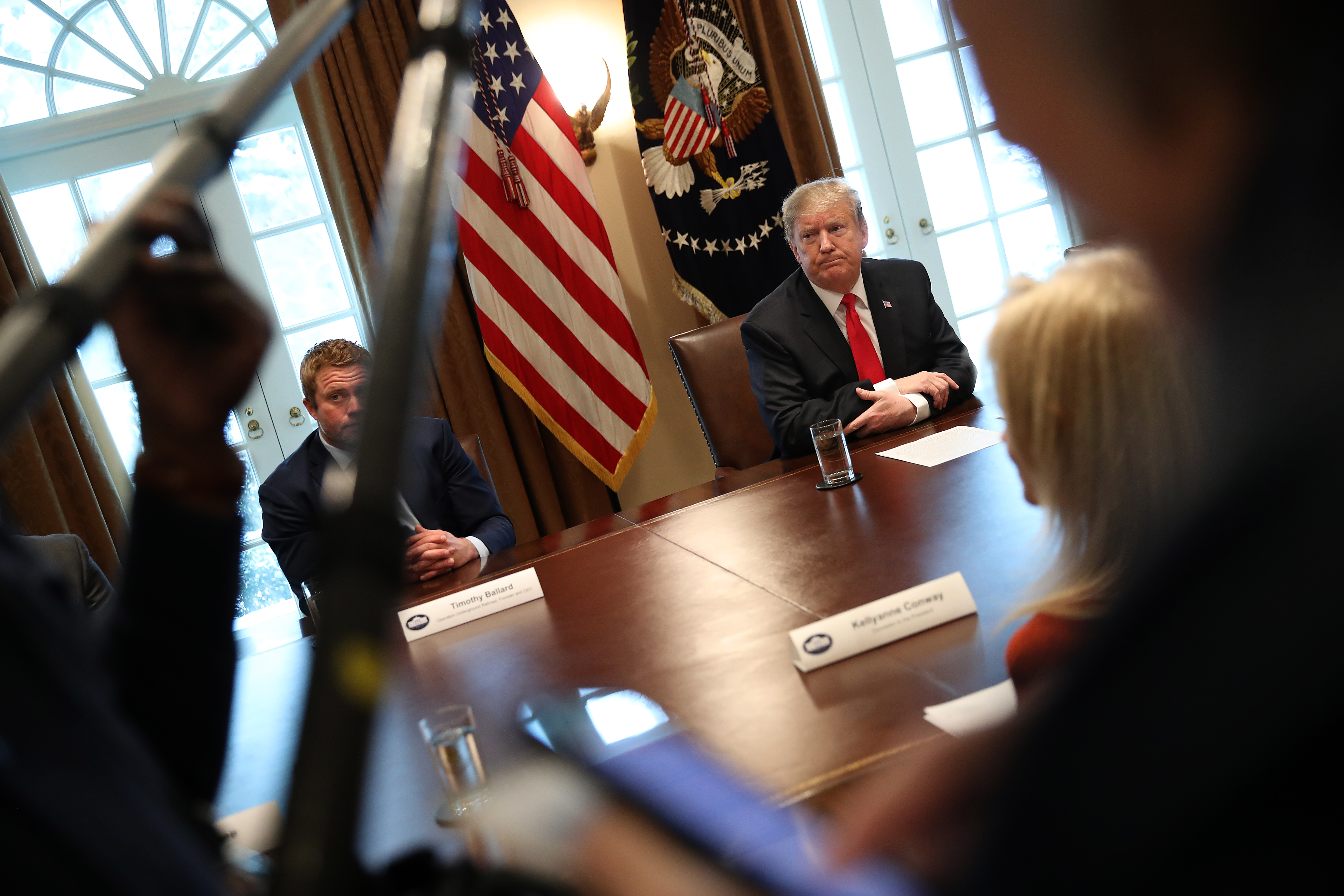By withdrawing from the INF Treaty, Trump puts America in grave danger
This might be his worst decision yet


A free daily email with the biggest news stories of the day – and the best features from TheWeek.com
You are now subscribed
Your newsletter sign-up was successful
President Trump has had a lot of bad ideas in his short, misbegotten political career. The announcement on Friday that America is withdrawing from the Intermediate-Range Nuclear Forces (INF) Treaty with Russia might just be the worst.
To understand why, it's important to be reminded of an essential truth about nuclear weapons: They are genocidal-level weaponry. One bomb can destroy a city. We've seen it happen — twice — in Japan. An actual nuclear war would probably end civilization. So any action that increases the number of such weapons — and thus makes their use more likely — isn't simply a bad idea, it's morally wrong.
President Ronald Reagan, for all his cowboy posturing the in 1980s, recognized that truth. "A nuclear war can never be won and must never be fought," he said in his 1984 State of the Union address. That's why he negotiated and signed the INF Treaty in 1987, joining Soviet Chairman Mikhail Gorbachev in an effort to bring an end to a decades-long nuclear arms race led by the two countries.
The Week
Escape your echo chamber. Get the facts behind the news, plus analysis from multiple perspectives.

Sign up for The Week's Free Newsletters
From our morning news briefing to a weekly Good News Newsletter, get the best of The Week delivered directly to your inbox.
From our morning news briefing to a weekly Good News Newsletter, get the best of The Week delivered directly to your inbox.
The treaty was certainly limited by its specificity: It eliminated land-based nuclear missiles with ranges between 500 and 1,000 miles. Still, it helped spark a decades-long pulling back from the brink: The Federation of American Scientists estimates that the number of nuclear warheads in the world topped out around 70,000 in 1985 and has since fallen, to fewer than 15,000 today.
Now that the treaty has been scuttled, it seems likely those numbers will start to rise.
Trump's defenders have what sounds like a good reason for withdrawing from the treaty: Russia started it. For several years, the U.S. has alleged that Russia is designing and deploying the type of cruise missile banned by the treaty. "We can no longer be restricted by the treaty while Russia shamelessly violates it," Secretary of State Mike Pompeo said in announcing the American withdrawal.
True, it's not fair that Russia is violating the treaty. Yes, the U.S. should offer an effective response.
A free daily email with the biggest news stories of the day – and the best features from TheWeek.com
But the U.S. under President Trump has made little apparent effort to seek a different kind of solution to the problem. The preferred action among his hawkish advisers has always been to start building more nukes. "This is a flat failure of Diplomacy 101," Tom Nichols, a professor of National Security Affairs at the U.S. Naval War College, tweeted over the weekend. "There was no 'or else' in the INF negotiation, because *we didn't want one*. Because we only pretended to want the treaty. And the Russians baited us into letting them out of it. So dumb."
Dumb — and dangerous.
In June, a study published in the journal Safety suggested that a smart country intent on ensuring its own survival would possess no more than 100 nuclear weapons. Any more than that, the authors said, would probably end up doing more harm than good. "With 100 nuclear weapons, you still get nuclear deterrence, but avoid the probable blowback from nuclear autumn that kills your own people," said one of the study's authors, Joshua Pearce, a professor at Michigan Technological University. "If we use 1,000 nuclear warheads against an enemy and no one retaliates, we will see about 50 times more Americans die than did on 9/11 due to the after-effects of our own weapons."
And that was the study's optimistic take: "We should be clear," Pearce said, "this analysis represents a severe underestimate on the number of dead Americans."
The study presumes, too, that nation-states can remain in full control of their nuclear arsenals. That's not a given: The U.S. has been plagued by security lapses in its nuclear program over the last decade — the more warheads we and other countries produce in a new arms race, the more likely it is that one or more could fall into the wrong hands.
Of course, there may not be such a thing as "right hands" when it comes to nukes. Trump's defenders can offer smart-sounding strategic reasons about why new weapons are necessary for America's defense. The reality, though, is that the more warheads we deploy, the less safe we become. This is Trump's worst decision; let's hope we can survive it.
Joel Mathis is a writer with 30 years of newspaper and online journalism experience. His work also regularly appears in National Geographic and The Kansas City Star. His awards include best online commentary at the Online News Association and (twice) at the City and Regional Magazine Association.
-
 Where to go for the 2027 total solar eclipse
Where to go for the 2027 total solar eclipseThe Week Recommends Look to the skies in Egypt, Spain and Morocco
-
 The end of mass-market paperbacks
The end of mass-market paperbacksUnder the Radar The diminutive cheap books are phasing out of existence
-
 Political cartoons for February 22
Political cartoons for February 22Cartoons Sunday’s political cartoons include Black history month, bloodsuckers, and more
-
 Epstein files topple law CEO, roil UK government
Epstein files topple law CEO, roil UK governmentSpeed Read Peter Mandelson, Britain’s former ambassador to the US, is caught up in the scandal
-
 Iran and US prepare to meet after skirmishes
Iran and US prepare to meet after skirmishesSpeed Read The incident comes amid heightened tensions in the Middle East
-
 Israel retrieves final hostage’s body from Gaza
Israel retrieves final hostage’s body from GazaSpeed Read The 24-year-old police officer was killed during the initial Hamas attack
-
 China’s Xi targets top general in growing purge
China’s Xi targets top general in growing purgeSpeed Read Zhang Youxia is being investigated over ‘grave violations’ of the law
-
 Panama and Canada are negotiating over a crucial copper mine
Panama and Canada are negotiating over a crucial copper mineIn the Spotlight Panama is set to make a final decision on the mine this summer
-
 Why Greenland’s natural resources are nearly impossible to mine
Why Greenland’s natural resources are nearly impossible to mineThe Explainer The country’s natural landscape makes the task extremely difficult
-
 Iran cuts internet as protests escalate
Iran cuts internet as protests escalateSpeed Reada Government buildings across the country have been set on fire
-
 US nabs ‘shadow’ tanker claimed by Russia
US nabs ‘shadow’ tanker claimed by RussiaSpeed Read The ship was one of two vessels seized by the US military
